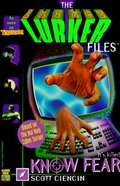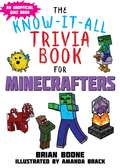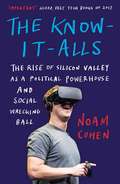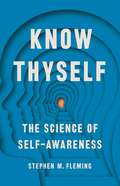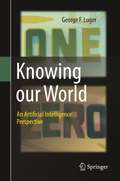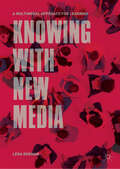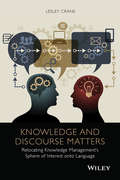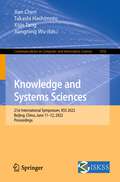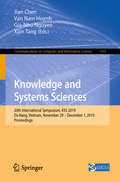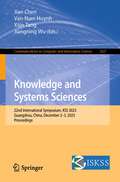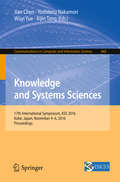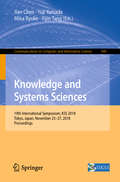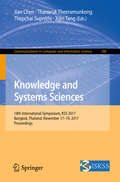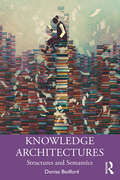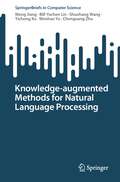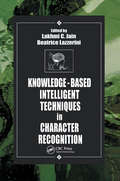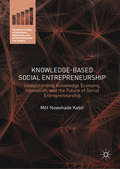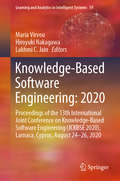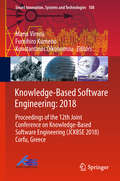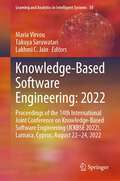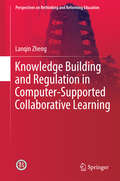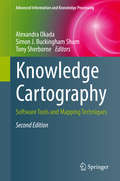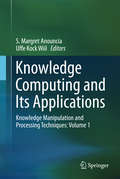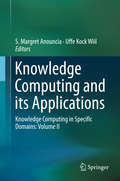- Table View
- List View
Know Fear (The Lurker Files #2)
by Scott CiencinThe Lurker continues to reign at Wintervale University -- a dark, terrible force at the heart of the campus computer network, weaving an electronic web of deceit. The Lurker can never have too many minions...
The Know-It-All Trivia Book for Minecrafters: Over 800 Amazing Facts and Insider Secrets
by Brian Boone Amanda BrackThe Know-It-All Trivia Book for Minecrafters is the must-have book of more than 800 incredible facts for your favorite multiplayer video game! Test your brains and stump your friends about life in the Overworld and down in the Nether, where Minecraft came from, and hundreds of other tips and Minecraft gaming secrets! Become a master builder of your own Minecraft smarts with The Know-It-All Trivia Book for Minecrafters! Inside you will find awesome trivia such as: Herobrine isn’t a real character programmed into the game. Urban legends insist that he’s a dead miner, or that Notch’s deceased brother haunts the game. It’s just a glitch that makes Steve sometimes appear to have spooky white eyes. They’re probably just bleary from playing too much Minecraft. The name of the main miner character in the game is Steve, right? Well, sort of. He didn’t ever have one until someone asked Notch in an interview if the character had a name. Notch’s response: “Steve?” The name stuck. We still don’t know what his last name is, though. This book is complete with silly illustrations to make becoming a master of Minecrafter facts even more fun. Whether you’re at home or school, you can have all your friends and family in awe of your Minecrafter knowledge!
The Know-It-Alls: The Rise of Silicon Valley as a Political Powerhouse and Social Wrecking Ball
by Noam CohenThe world&’s tech giants are at the centre of controversies over fake news, free speech and hate speech on platforms where influence is bought and sold. Yet, at the outset, almost everyone thought the internet would be a positive, democratic force, a space where knowledge could be freely shared to enable everyone to make better-informed decisions. How did it all go so wrong? Noam Cohen reports on the tech libertarians of Silicon Valley, from the self-proclaimed geniuses Jeff Bezos, Peter Thiel, Reid Hoffman and Mark Zuckerberg to the early pioneers at Stanford University, who have not only made the internet what it is today but reshaped society in the process. It is the story of how the greed, bias and prejudice of one neighbourhood is fracturing the Western world.
Know Thyself: The Science of Self-Awareness
by Stephen M FlemingUnlock the secrets to understanding yourself and others with the surprising science of the human mind's greatest power: introspection. &“Are you sure?&” Whether in a court room, a doctor&’s office, a gameshow&’s hot seat, or a student&’s desk, we are always trying to answer that question. Should we accept eyewitness testimony or a physician&’s diagnosis? Do we really want to risk it all on a final question? And what should we be studying in order to do as well as possible on a test? In short, how do we know what we and others know—or as importantly, don&’t know? As cognitive neuroscientist Stephen Fleming shows in Know Thyself, we do this with metacognition. Metacognition, or thinking about thinking, is the most important tool we have for understanding our own mind. Metacognition is an awesome power: It is what enables self-awareness as well as what lets us think about the minds of others. It is the ultimate human trait, and in its most rarefied forms is a power that neither other animals, nor our current artificial intelligences, have. Metacognition teaches us the limits of our own knowledge. Once we understand what it is and how it works, we can improve our performance and make better decisions. For example, on the SAT, it helps us gauge when we should skip a question rather than lose points getting an answer wrong. Know Thyself, like the metacognition itself, is equal parts scientific, philosophical, and practical. And that means, like Thinking, Fast and Slow and Predictably Irrational, it&’s that rarest of books: one that can both expand our minds and change our lives.
Knowing our World: An Artificial Intelligence Perspective
by George F. LugerKnowing our World: An Artificial Intelligence Perspective considers the methodologies of science, computation, and artificial intelligence to explore how we humans come to understand and operate in our world. While humankind’s history of articulating ideas and building machines that can replicate the activity of the human brain is impressive, Professor Luger focuses on understanding the skills that enable these goals. Based on insights afforded by the challenges of AI design and program building, Knowing our World proposes a foundation for the science of epistemology. Taking an interdisciplinary perspective, the book demonstrates that AI technology offers many representational structures and reasoning strategies that support clarification of these epistemic foundations. This monograph is organized in three Parts; the first three chapters introduce the reader to the foundations of computing and the philosophical background that supports the AI tradition. These three chapters describe the origins of AI, programming as iterative refinement, and the representations and very high-level language tools that support AI application building. The book’s second Part introduces three of the four paradigms that represent research and development in AI over the past seventy years: the symbol-based, connectionist, and complex adaptive systems. Luger presents several introductory programs in each area and demonstrates their use. The final three chapters present the primary theme of the book: bringing together the rationalist, empiricist, and pragmatist philosophical traditions in the context of a Bayesian world view. Luger describes Bayes' theorem with a simple proof to demonstrate epistemic insights. He describes research in model building and refinement and several philosophical issues that constrain the future growth of AI. The book concludes with his proposal of the epistemic stance of an active, pragmatic, model-revising realism.
Knowing with New Media: A Multimodal Approach for Learning
by Lena RedmanThis cutting edge book considers how advances in technologies and new media have transformed our perception of education, and focuses on the impact of the privatisation of digital tools as a mean of knowledge production. Arguing that education needs to adapt to the modern learner, the book’s unique approach is based on a disassociation with the deeply ingrained attitude with which people have traditionally viewed education – learning the existing symbolic systems of certain disciplines and then expressing themselves strictly within the operational modes of these systems. The ways of knowledge production – exploring, recording, representing, making meaning of and sharing human experiences – have been fundamentally transformed through the infusion of digital technologies into all aspects of human activity, allowing learners to engage with their immediate natural, social and cultural environments by capitalising on their individual abilities and interests. This book proposes a new approach to teaching and learning termed ‘cinematic bricolage’, which involves generating knowledge from heterogeneous resources in a ‘do-it-yourself’ manner while making meaning through multimodal representations. It shows how cinematic bricolage reconnects ways of knowing with ways of being, empowering the individual with a sense of personal identity and responsibility, helping to shape more aware social citizens.
Knowledge and Discourse Matters
by Lesley CraneThis book provides a practical approach to harnessing knowledge in organizations. Its focus is on knowledge sharing, tacit knowing, and a view of knowledge as an accomplishment in social interaction. The aim of this book is to explore and show how the phenomena of trust, risk and identity, as contexts constructed by speakers themselves, influence and mediate knowledge sharing in organizational encounters. The research particularly reveals how tacit knowledge (knowing), affects the scope and directions of everyday conversation. The first part of the book presents a comprehensive critical appraisal and analysis of the field of organizational knowledge management, followed by an introduction to the theory and methodology of discourse analysis, and a view of tacit knowing drawn from studies in implicit learning. The second part reports the detailed analysis and findings of original field research, investigating how participants in regular organizational meetings, including a discussion forum, manage the business of sharing knowledge. From the perspective of the research methodology, drawing on Discursive Psychology, knowledge is approached as an accomplishment in social interaction, with talk and text shown to be constructive, functional and action-oriented. Presents a rigorous, evidence-based approach to Knowledge Management using original research Approaches discourse as the location of knowledge work, and the site to which knowledge management practice should be focused Positions the actions of knowledge work in everyday talk and text, thus giving practitioners a ready toolset to improve their strategies, practices and understanding of knowledge within organizations Knowledge and Discourse Matters: Relocating Knowledge Management's Sphere of Interest onto Language is a great reference for organizational leaders, knowledge managers, and human resource managers. Dr. Lesley Crane is an independent consultant specializing in knowledge management, and technology supported learning for adults (e-learning). Much of her consultancy work involves providing strategic advice and research on the effective use of e-content, e-tools and the use of new technologies in the delivery of teaching and learning. Prior to working as a consultant, Lesley was Managing Director of her own SME business specializing in creative e-learning design and development for public and private sector organizations.
Knowledge and Systems Sciences: 21st International Symposium, KSS 2022, Beijing, China, June 11–12, 2022, Proceedings (Communications in Computer and Information Science #1592)
by Jian Chen Takashi Hashimoto Xijin Tang Jiangning WuThis book constitutes the refereed proceedings of the 21st International Symposium on Knowledge and Systems Sciences, KSS 2022, held in Beijing, China, in June 2022.The 14 revised full papers and 3 short paper presented were carefully reviewed and selected from 51 submissions. The papers are organized in topical secions on data mining and machine learning; model-based systems engineering; complex systems modeling and knowledge technologies.
Knowledge and Systems Sciences: 20th International Symposium, KSS 2019, Da Nang, Vietnam, November 29 – December 1, 2019, Proceedings (Communications in Computer and Information Science #1103)
by Jian Chen Van Nam Huynh Gia-Nhu Nguyen Xijin TangThis book constitutes the refereed proceedings of the 20th International Symposium on Knowledge and Systems Sciences, KSS 2019, held in Da Nang, Vietnam, in November 2019. The 14 revised full papers presented were carefully reviewed and selected from 31 submissions. This year KSS provides opportunities for presenting interesting new research results, facilitating interdisciplinary discussions, and leading to knowledge transfer under the theme of "Knowledge Science in the Age of Big Data".
Knowledge and Systems Sciences: 22nd International Symposium, KSS 2023, Guangzhou, China, December 2–3, 2023, Proceedings (Communications in Computer and Information Science #1927)
by Jian Chen Van-Nam Huynh Xijin Tang Jiangning WuThis book constitutes the proceedings of the 22nd International Symposium, KSS 2023, held in Guangzhou, China, during December 2–3, 2023. The 20 full papers included in this volume were carefully reviewed and selected from 56 submissions. The volume is divided in topical sections that cover the following topics: data mining and machine learning, complex systems modeling, decision analysis and knowledge management, opinion mining and knowledge technologies.
Knowledge and Systems Sciences
by Jian Chen Yoshiteru Nakamori Wuyi Yue Xijin TangThis book constitutes the refereed proceedings of the 17th International Symposium, KSS 2016, held in Kobe, Japan, in November 2016. The 21 revised full papers presented were carefully reviewed and selected from 48 submissions. The papers cover topics such as: Algorithms for Big Data; Big Data and education; Big Data and healthcare; Big Data and tourism; Big Data and social media oriented knowledge discovery and data mining, text mining, recommendation system, etc; Big Data, social media and societal management; creation of agent-based social systems sciences; collective intelligence; complex system modeling and complexity; decision analysis and decision support systems; internet+ and agriculture; internet+ and open innovation; knowledge creation, creativity support, awareness support, etc. ; knowledge systems engineering and knowledge management; meta-synthesis and advanced modeling; opinion dynamics and opinion mining; OR on knowledge and systems sciences; problem structuring methods and system methodologies toward wicked problems; service systems science; smart city; social dynamic network modeling; Web intelligence.
Knowledge and Systems Sciences: 19th International Symposium, KSS 2018, Tokyo, Japan, November 25-27, 2018, Proceedings (Communications in Computer and Information Science #949)
by Jian Chen Yuji Yamada Mina Ryoke Xijin TangThis book constitutes the refereed proceedings of the 19th International Symposium, KSS 2019, held in Tokyo, Japan, in November 2018.The 20 revised full papers presented were carefully reviewed and selected from 54 submissions. This year KSS 2018 provides opportunities for presenting interesting new research results, facilitating interdisciplinary discussions, and leading to knowledge transfer under the theme of "Knowledge Acquisition from Structured and Unstructured Data for Effective Social Implementation".
Knowledge and Systems Sciences: 18th International Symposium, KSS 2017, Bangkok, Thailand, November 17–19, 2017, Proceedings (Communications in Computer and Information Science #780)
by Jian Chen, Thanaruk Theeramunkong, Thepchai Supnithi and Xijin TangThis book constitutes the refereed proceedings of the 18th International Symposium, KSS 2017, held in Bangkok, Thailand, in November 2017.The 21 revised full papers presented were carefully reviewed and selected from 63 submissions. This year KSS 2017 provides opportunities for presenting interesting new research results, facilitating interdisciplinary discussions, and leading to knowledge transfer under the theme of "Artificial Intelligence and Information Systems for Knowledge, Technology and Service Management".
Knowledge and Systems Sciences: 17th International Symposium, KSS 2016, Kobe, Japan, November 4-6, 2016, Proceedings (Communications in Computer and Information Science #660)
by Jian Chen, Yoshiteru Nakamori, Wuyi Yue and Xijin TangThis book constitutes the refereed proceedings of the 17th International Symposium, KSS 2016, held in Kobe, Japan, in November 2016.The 21 revised full papers presented were carefully reviewed and selected from 48 submissions. The papers cover topics such as: Algorithms for Big Data; Big Data and education; Big Data and healthcare; Big Data and tourism; Big Data and social media oriented knowledge discovery and data mining, text mining, recommendation system, etc; Big Data, social media and societal management; creation of agent-based social systems sciences; collective intelligence; complex system modeling and complexity; decision analysis and decision support systems; internet+ and agriculture; internet+ and open innovation; knowledge creation, creativity support, awareness support, etc.; knowledge systems engineering and knowledge management; meta-synthesis and advanced modeling; opinion dynamics and opinion mining; OR on knowledge and systems sciences; problem structuring methods and system methodologies toward wicked problems; service systems science; smart city; social dynamic network modeling; Web intelligence.
Knowledge Architectures: Structures and Semantics
by Denise BedfordKnowledge Architectures reviews traditional approaches to managing information and explains why they need to adapt to support 21st-century information management and discovery. Exploring the rapidly changing environment in which information is being managed and accessed, the book considers how to use knowledge architectures, the basic structures and designs that underlie all of the parts of an effective information system, to best advantage. Drawing on 40 years of work with a variety of organizations, Bedford explains that failure to understand the structure behind any given system can be the difference between an effective solution and a significant and costly failure. Demonstrating that the information user environment has shifted significantly in the past 20 years, the book explains that end users now expect designs and behaviors that are much closer to the way they think, work, and act. Acknowledging how important it is that those responsible for developing an information or knowledge management system understand knowledge structures, the book goes beyond a traditional library science perspective and uses case studies to help translate the abstract and theoretical to the practical and concrete. Explaining the structures in a simple and intuitive way and providing examples that clearly illustrate the challenges faced by a range of different organizations, Knowledge Architectures is essential reading for those studying and working in library and information science, data science, systems development, database design, and search system architecture and engineering.
Knowledge-augmented Methods for Natural Language Processing (SpringerBriefs in Computer Science)
by Meng Jiang Bill Yuchen Lin Shuohang Wang Yichong Xu Wenhao Yu Chenguang ZhuOver the last few years, natural language processing has seen remarkable progress due to the emergence of larger-scale models, better training techniques, and greater availability of data. Examples of these advancements include GPT-4, ChatGPT, and other pre-trained language models. These models are capable of characterizing linguistic patterns and generating context-aware representations, resulting in high-quality output. However, these models rely solely on input-output pairs during training and, therefore, struggle to incorporate external world knowledge, such as named entities, their relations, common sense, and domain-specific content. Incorporating knowledge into the training and inference of language models is critical to their ability to represent language accurately. Additionally, knowledge is essential in achieving higher levels of intelligence that cannot be attained through statistical learning of input text patterns alone. In this book, we will review recent developmentsin the field of natural language processing, specifically focusing on the role of knowledge in language representation. We will examine how pre-trained language models like GPT-4 and ChatGPT are limited in their ability to capture external world knowledge and explore various approaches to incorporate knowledge into language models. Additionally, we will discuss the significance of knowledge in enabling higher levels of intelligence that go beyond statistical learning on input text patterns. Overall, this survey aims to provide insights into the importance of knowledge in natural language processing and highlight recent advances in this field.
Knowledge-Based Intelligent Techniques in Character Recognition (International Series On Computational Intelligence Ser. #9)
by Lakhmi C. Jain; Beatrice LazzeriniKnowledge-Based Intelligent Techniques in Character Recognition presents research results on intelligent character recognition techniques, reflecting the tremendous worldwide interest in the applications of knowledge-based techniques in this challenging field.This resource will interest anyone involved in computer science, computer engineering, applied mathematics, or related fields. It will also be of use to researchers, application engineers and students who wish to develop successful character recognition systems such as those used in reading addresses in a postal routing system or processing bank checks.Features
Knowledge-Based Social Entrepreneurship: Understanding Knowledge Economy, Innovation, and the Future of Social Entrepreneurship (Palgrave Studies in Democracy, Innovation, and Entrepreneurship for Growth)
by Mitt Nowshade KabirSocial entrepreneurship is on the rise and social enterprises are solving some of the most critical and enduring social problems by using innovative, pragmatic and sustainable business models. Access to knowledge thanks to the Internet and rapid expansion of the knowledge economy are opening new opportunities for social ventures. With knowledge-based social entrepreneurship where knowledge is the primary resource, more pressing social problems can be addressed by using advanced technologies. This book investigates this emerging concept, possibilities that it holds, its place in today’s economy, and links bridges between knowledge, innovation, and social entrepreneurship. Academics, entrepreneurs, students, and NGOs will find the theoretical and practical information presented in this book extremely valuable.
Knowledge-Based Software Engineering: Proceedings of the 13th International Joint Conference on Knowledge-Based Software Engineering (JCKBSE 2020), Larnaca, Cyprus, August 24-26, 2020 (Learning and Analytics in Intelligent Systems #19)
by Lakhmi C. Jain Maria Virvou Hiroyuki NakagawaThis book summarizes the research findings presented at the 13th International Joint Conference on Knowledge-Based Software Engineering (JCKBSE 2020), which took place on August 24–26, 2020. JCKBSE 2020 was originally planned to take place in Larnaca, Cyprus. Unfortunately, the COVID-19 pandemic forced it be rescheduled as an online conference. JCKBSE is a well-established, international, biennial conference that focuses on the applications of artificial intelligence in software engineering. The 2020 edition of the conference was organized by Hiroyuki Nakagawa, Graduate School of Information Science and Technology, Osaka University, Japan, and George A. Tsihrintzis and Maria Virvou, Department of Informatics, University of Piraeus, Greece. This research book is a valuable resource for experts and researchers in the field of (knowledge-based) software engineering, as well as general readers in the fields of artificial and computational Intelligence and, more generally, computer science wanting to learn more about the field of (knowledge-based) software engineering and its applications. An extensive list of bibliographic references at the end of each paper helps readers to probe further into the application areas of interest to them.
Knowledge-Based Software Engineering: Proceedings of the 12th Joint Conference on Knowledge-Based Software Engineering (JCKBSE 2018) Corfu, Greece (Smart Innovation, Systems and Technologies #108)
by Maria Virvou Fumihiro Kumeno Konstantinos OikonomouThis book summarizes the new research results presented at the 12th Joint Conference on Knowledge-Based Software Engineering (JCKBSE 2018), which took place on August 27–30, 2018 on the island of Corfu, Greece. The JCKBSE is a well-established international biennial conference that focuses on the applications of Artificial Intelligence in Software Engineering. The JCKBSE 2018 was organized by the Department of Informatics of the University of Piraeus, the Department of Computer and Information Engineering of Nippon Institute of Technology, and the Department of Informatics of Ionian University. The book will benefit not only experts and researchers in the field of (Knowledge-Based) Software Engineering, but also general readers in the fields of Artificial Intelligence, Computational Intelligence and Computer Science who wish to learn more about the field of (Knowledge-Based) Software Engineering and its applications. An extensive list of bibliographic references at the end of each paper encourages readers to probe further into the application areas that interest them most.
Knowledge-Based Software Engineering: Proceedings of the 14th International Joint Conference on Knowledge-Based Software Engineering (JCKBSE 2022), Larnaca, Cyprus, August 22-24, 2022 (Learning and Analytics in Intelligent Systems #30)
by Maria Virvou Takuya Saruwatari Lakhmi C. JainThis book contains extended versions of the works and new research results presented at the 14th International Joint Conference on Knowledge-based Software Engineering (JCKBSE2022). JCKBSE2022 was originally planned to take place in Larnaca, Cyprus. Unfortunately, the COVID-19 pandemic forced it to be rescheduled as an online conference. JCKBSE is a well-established international biennial conference that focuses on the applications of Artificial Intelligence on Software Engineering. The 14th International Joint Conference on Knowledge-based Software Engineering (JCKBSE2022) was organized by the Department of Informatics of the University of Piraeus, Greece. This book is a valuable resource for experts and researchers in the field of (knowledge-based) software engineering. It is also valuable to general readers in the fields of artificial and computational intelligence and, more generally, computer science, wishing to learn more about the exciting field of (knowledge-based) software engineering and its applications. An extensive list of bibliographic references at the end of each chapter helps readers to probe deeper into the application areas of interest to them.
Knowledge Building and Regulation in Computer-Supported Collaborative Learning
by Lanqin ZhengThis book proposes and validates an information flow approach to analyzing knowledge co-construction and predicting group performance in the context of collaborative learning. In addition, it highlights the importance of socially shared regulation in collaborative learning, and illustrates in detail how it can be analyzed and promoted. The book investigates several innovative examples, including: Methodological approaches to studying and analyzing knowledge building and regulation in collaborative learning; Social software tools for capturing the dynamics of knowledge building and regulation in collaborative learning; Collective regulatory mechanisms to scaffold socially shared regulation in real-life collaborative learning; and Scripts and interventions to facilitate effective and productive collaborative learning on the basis of several case studies. The original methodological contributions to the analysis of knowledge building and scaffolding socially shared regulation make this an essential read for anyone interested in collaborative learning. This book will also be of interest to a wide audience of researchers, teachers, and students in the field of collaborative learning, as well as the rapidly growing community of people investigating how collaborative learning can be effectively used in education.
Knowledge Cartography
by Simon J. Buckingham Shum Alexandra Okada Tony SherborneKnowledge maps are ideal tools for capturing, organizing and extracting meaning from many different sources. They provide powerful graphic tools for classifying, representing and communicating information. This book discusses significant new research and explains its underlying principles in terms of Knowledge Cartography. With contributions from leading researchers and practitioners, it offers a rich variety of conceptual frameworks, mapping techniques and case studies.
Knowledge Computing and Its Applications
by S. Margret Anouncia Uffe Kock WiilThis book provides a major forum for the technical advancement of knowledge management and its applications across diversified domains. Pursuing an interdisciplinary approach, it focuses on methods used to identify and acquire valid, potentially useful knowledge sources. Managing the gathered knowledge and applying it to multiple domains including health care, social networks, data mining, recommender systems, image processing, pattern recognition and predictions using machine learning techniques is the major strength of this book. Effective knowledge management has become a key to the success of business organizations, and can offer a substantial competitive edge. So as to be accessible to all scholars, this book combines the core ideas of knowledge management and its applications in numerous domains, illustrated in case studies. The techniques and concepts proposed here can be extended in future to accommodate changing business organizations’ needs as well as practitioners’ innovative ideas.
Knowledge Computing and its Applications: Knowledge Manipulation And Processing Techniques: Volume 1
by S. Margret Anouncia Uffe Kock WiilThis book highlights technical advances in knowledge management and their applications across a diverse range of domains. It explores the applications of knowledge computing methodologies in image processing, pattern recognition, health care and industrial contexts. The chapters also examine the knowledge engineering process involved in information management. Given its interdisciplinary nature, the book covers methods for identifying and acquiring valid, potentially useful knowledge sources. The ideas presented in the respective chapters illustrate how to effectively apply the perspectives of knowledge computing in specialized domains.
